This article explains Madava nidana 69th chapter “Visha Roga Nidanam”. Causes, pathology and symptoms of Visha Roga are explained in this chapter. Visha Roga means complications due to poisoning.
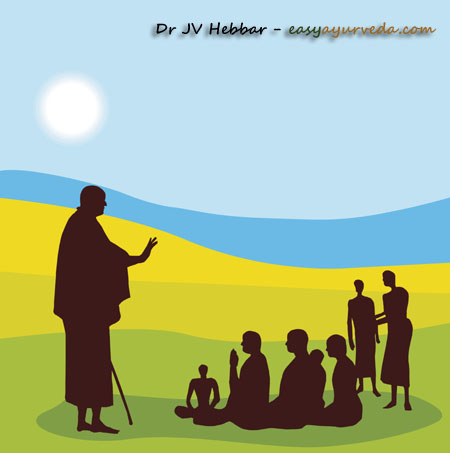

Visha Bheda
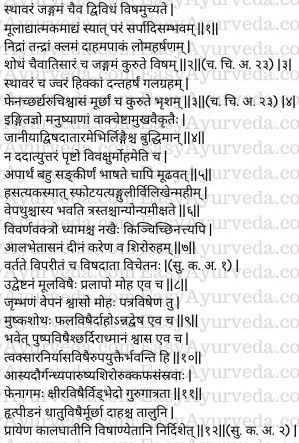

Types of Poisons
Poisons are of two kinds – Sthavara Visha and Jangama Visha.
Poisons obtained from roots and other parts of the plants (leaves, flowers etc) are known as Sthavara Visa.
Poisons of animals like snakes are called Jangama Visa. (1)
General symptoms caused by the effect of Jangama Visha
Sleep, stupor, exhaustion, burning sensation, indigestion, horripilations, swelling and diarrhoea are the general symptoms caused by (the effect of) Jangama Visha (animal poison).(2)
General symptoms caused by the effect of Sthavara Visha
The general symptoms caused (by the effect of) Sthavara Visha include – fever, hiccough, tingling sensation in the teeth (gums), catch / stiffness / choking in the throat, vomiting of froth, loss of taste (appetite), difficulty in breathing and fainting. (3)
Read – Visha, Upavisha: Types, Qualities, Shodhana, Sevana vidhi, Matra
Visha Datara
Signs of person who is habituated to administer poisons to others
An intelligent person (physician) who can identify the signs and expressions of anyone should also find out the characteristic features of a Vishadata (person who is habituated to administer poisons to others) by his talks, actions and facial expressions and also with the help of below mentioned signs –
- When asked about anything the person (who has poisoned) will either not reply or even if he tries to reply he fumbles or gets confused (scared), acts ignorant
- Gives wrong replies, speaks too much or gives irrelevant replies (in an unclear way) just like a fool / idiot
- Laughs suddenly without any reason
- Cracks his knuckles (makes sounds from his fingers)
- Scratches the ground (earth) with his toes / fingers
- Keeps shivering, gets scared and looks at others (for help or support),
- Face becomes discoloured and unclean (bad expressions)
- Keeps cutting something or the other (grass etc) with his nails,
- Takes seat (sits) with timidity and hesitation,
- Repeatedly touches (pulls) the hairs on his head with his hands
- Keeps changing his seat and position every now and then
- Will not be in his senses (behaves in an unusual manner) (4-7)
Read – Charaka Visha Chikitsa 23rd Chapter of Chikitsa Sthana
General symptoms produced by poisons derived from roots etc
Mula Visha/ Poisonous roots – when consumed will produce pain all over the body as though hit by a stick, delirium and delusion.
Patra Visha/ Poisonous leaves – when consumed will produce excess yawning, tremors, difficulty in breathing and delusion.
Phala Visha/ Poisonous fruits – when consumed will cause swelling in the scrotum, burning sensation and aversion towards food.
Puspa Visha/ Poisonous flowers – when consumed will produce vomiting, distension of the abdomen and difficulty in breathing.
Twaksara & Niryasa Visha / Poisonous bark and resin (gum) – when consumed will produce foul smell in the mouth, roughness of the body, headache and discharge of kapha from mouth.
Ksira Visha / Poisonous latex – when consumed will cause frothy discharges from the mouth, diarrhoea and feeling of heaviness in the body.
Dhatu Visha / Poisonous minerals (ores) etc – when consumed will produce pain in the region of the heart (cardiac region), fainting / loss of consciousness and burning sensation in the palate.
Probably all the above kinds of poisons are considered to be kalaghatini i.e., would kill the person in due course of time. (8-12)
Read – Anna Visha – When Food Turns Toxic: Causes, Symptoms
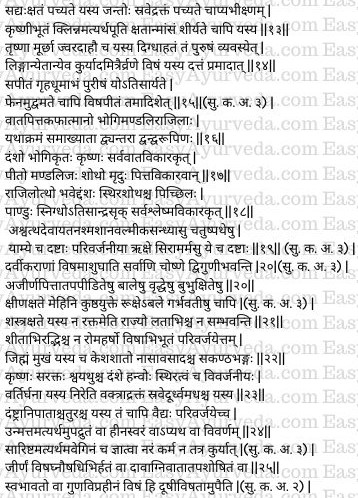

Digdahata Laksana
Digdahata (wounds caused by poison smeared weapons) – The person in whom the fresh wound undergoes immediate suppuration, discharges plenty of blood and suppuration becomes progressive (occurs repeatedly), the wound becomes black in colour, has too much of discharge, is foul smelling and the muscles surrounding the wound fall off all by themselves (after getting decomposed) are the signs of wounds caused by weapons smeared with poison. The person will also suffer from thirst, fainting, fever and burning sensation.
Vishadigda Laksana
Vishadigda (wounds poisoned by poison) – Sometimes when a person is not cautious, some enemies will poison their wounds (or even make the wounded person drink poison forcefully). Even in these conditions the signs and symptoms mentioned above (digdahata) will be found. This is called Visadigda.
Vishapita Laksana
Vishapita (one who has drunk poison) – A person should be considered to have consumed (administered) poison when he repeatedly eliminates stools (diarrhoea) which are yellow in colour or a colour resembling soot of chimney (black), and has frothy vomiting. (13-15)
1.It is more appropriate to read ‘Mukha’ instead of Muska in this stanza.
Read – Food Poisoning: Ayurvedic Concept, Remedies, Herbs, Diet
Sarpa and Sarpavisha
Snakes and snake poison
Bhogi – snakes with a hood, Mandala – snakes with patches and Rajila – snakes with stripes are predominant in vata, pitta and kapha doshas respectively (tend to vitiate these doshas respectively). The hybrid snakes will have mixed qualities of two or more doshas. (16)
Symptoms of bites of different kinds of snakes
- Bhogi Sarpa – The site of the bite by a hooded snake will become black. It causes all the symptoms (diseases) of vata increase.
- Mandala Sarpa – The bite of the mandala snake (snake with patches) will become yellow in colour. The swelling which occurs is soft and it causes all the symptoms (diseases) of pitta to increase.
- Rajila Sarpa – The site of the bite of rajila snake (striped snakes) will have an immobile (hard) swelling, is sticky, of yellowish white (pale) colour and discharges very thick blood. It causes all the symptoms (diseases) of kapha to increase. (17-18)
Prognosis of snake bite
Snake bite happening in the below mentioned places should be rejected treatment (because they are incurable) –
- Near / Below Aswattha tree (Ficus religiosa)
- In a temple
- In a crematorium
- In / near an anthill
- In the evening time
- At crossroads
- In Bharani constellation
- If the bite is on veins and vital spots of the body (or vital spots of the body wherein there is predominance of veins) (19)
Effect of snake bite on life
The poison of darvikara sarpa i.e., hooded snakes kill the person immediately (quickly). The effect of the other poisons becomes twice powerful in hot season (or when associated with heat – as in exposure to sunlight, fire, hot objects, fomentation etc). (20)
Other conditions in which the effect of poisons becomes powerful
Likewise, the effect of poison will become doubly powerful (incurable) in persons suffering from indigestion, those afflicted by diseases caused by increased pitta, and exposed to sun. It is also true in case of children, aged people, and those hungry and wounded / emaciated due to wounds, in those suffering from diabetes and skin diseases (leprosy), in those who have dryness of the body, malnourished (weak) and in pregnant women.
Other signs and symptoms of incurability of snake bite cases
If in a person who has been bitten by a snake – if bleeding does not occur in spite of a cut being made by a sharp instrument, if linear marks do not appear on the skin (at the site) even if beaten or tied with a creeper / rope, horripilations does not occur in spite of sprinkling with cold water (cannot bring the person back to consciousness by sprinkling cold water), he or she should be refused treatment (because they are incurable).
Irregularity / crookedness of the face, falling of hairs (or the person pulling off his hairs by himself), displacement / deformity of the nose, inability to hold the neck straight in position (hoarseness of voice), reddish black coloured swelling at the site of bite, and stiffness of the lower jaw (lockjaw) when seen in the patient who has been bitten by the snake should be rejected (because the presence of these symptoms indicates that the condition is incurable).
Similarly a person in whom thick wick-like saliva comes out of the mouth, bleeding occurs through both upper (nose, mouth etc) and lower (anal, urethra etc) passages, and the physician attending such person not having expertise to remove poison (impression of four fangs are found at the site of bite) should also be refused treatment considering that it is incurable.
The person who after being bitten by snake has become insane (lost the mind balance), has many complications, feeble voice, and discolouration, who has developed signs of death and who does not have urges of the body (in whom the urges of defecation, urination etc are not manifested) should be rejected, the condition being incurable. (21-24)
Read – Bad Food Combinations and Solution as Per Ayurveda
Dusivisha
DusiVisha is a poison or poisonous substance which is very old, whose properties have been nullified as an effect of (after being mixed with) anti-poisonous drugs, which has been dried up by the forest fire, breeze and sunlight and by nature does not have powerful properties of poisons (having lesser properties in comparison to a strong poison). (25)
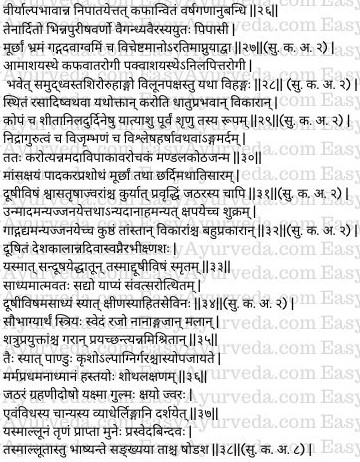

Properties of poor potency poisons
Because of its poor potency and being associated with kapha (kapha dilutes the strong and intense properties of the poison), it does not kill the person (suddenly or even later). Such a poison remains inside the body for years without undergoing digestion. The person who is afflicted with such poison will have diarrhoea, discolouration, and bad smell from the body, bad smell from the mouth, thirst, fainting, giddiness, stammer, vomiting, unnatural body movements and restlessness. (26-27)
Symptoms of DusiVisha based on the place / organ in which it is located
If Dusivisa is located in the stomach, diseases of kapha-vata origin get manifested. If DusVisha is located in the intestines, the person would become a patient of diseases of vata-pitta origin. Apart from this, due to the loss of hairs of the head and body, he appears like a bird whose wings have been cut off. (28)
Symptoms of dusiVisha lodged in different tissues
If the dusiVisha is lodged in rasa and other tissues of the body, it produces the symptoms / diseases which are likely to develop in those tissues. The symptoms become severe and troublesome due to exposure to cold winds and on cloudy days. First make a note of its premonitory symptoms. (29)
Premonitory Symptoms of effect of DusiVishas
Excessive sleep, feeling of heaviness of the body, yawning, looseness of the body parts, horripilations, and pains in the body parts (as if beaten), (later) feeling of intoxication after having meals, indigestion, loss of taste (tastelessness), manifestation of rashes and papules, depletion of muscles (emaciation), swelling of feet and hands, fainting, vomiting, loose motions (diarrhoea), dyspnoea (difficulty in breathing), thirst, fever and enlargement of abdomen – are the premonitory symptoms of effect of dusiVisha. (30-31)
Different diseases caused by DusiVisha
Some kinds of dusiVisha will produce insanity, some others would produce flatulence (enlargement of abdomen) and some other types would bring about loss of semen. Other types of dusivisa will cause stuttering / stammer and some others will cause skin disorders (leprosy) and many other kinds of diseases. (32)
Read – Leprosy Awareness: Early Detection Is Important
Definition of Dusivisha
Dūsī visha is so called because it keeps vitiating the dhātus (tissues) often, being aggravated by the influence of deśa (habitat), kāla (season), anna (food) and divāsvapana (day sleep). Dusivisa of recent origin and present in those who have self-control (strong will) is curable. It becomes manageable after one year (can be cured but it keeps recurring when favourable conditions are available, hence needs monitoring throughout life). It is incurable in those who are emaciated (weak) and are habituated to getting indulged in unhealthy foods and life activities. (33-34)
Garavisha
Symptoms of persons affected by Garavisha
Women expecting wealth (or other benefits or to take someone under their control and influence) administer sweat, menstrual blood, excretions (waste products) produced by different body parts, or artificial poison provided by enemies mixed with food. Poisons administered in this form are called Garavisha (homicidal poison).
Effect of Garavisha (symptoms of impact of garavisha) – The person affected by garavisa becomes pale, emaciated, and would have poor digestion. These things will produce garavisha in the body of the person who has consumed them. The person will have pain in vital organs of the body, distension of the body, symptoms of swelling in their hands, abdominal disorders (abdomen enlargement), duodenal disorders, tuberculosis, abdominal tumour, emaciation (consumption), fever and symptoms of many such (allied) diseases. (35-37)
Lutavisha
The droplets of sweat of the sage Vaşistha (who had become angry with Viswamitra at the abduction of Kamadhenu, the cow) which fell on the grass become converted into Lūtās (spiders). Lutas are of sixteen kinds. (38)
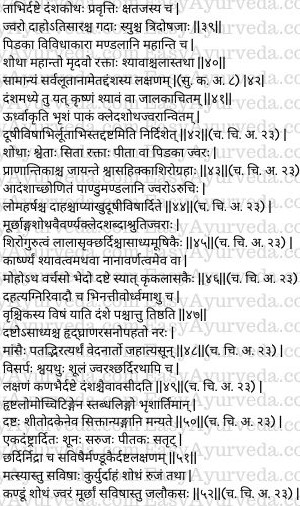

General Symptoms of Spider bite
When bitten by these spiders, putrefaction at the site of the bite occurs. Apart from this, there will be bleeding, fever, burning sensation, diarrhoea and other symptoms (diseases) caused by the increase of all the three doshas together. Papules of different kinds, big patches, profound soft swelling, red or black in colour and movable are formed. These are the general symptoms of spider bite. (39-40)
Symptoms of bite of Dusivisha type of spiders
Below mentioned are the features (symptoms) found in person bitten by dusivisha type of spiders (spiders having slow acting poisons) –
Symptoms of bite of sauvarnika etc spiders
Bite of Sauvarnika etc eight types of spiders’ cause swelling, along with papules which are white, red or yellow in colour, fever, dyspnoea (difficulty in breathing), hiccough and headache. The poisons of these types of spiders are said to be quick acting and fatal. (43)
Symptoms of Musika Dusivisha
The symptoms of poisoning by musika (rat) visha include bleeding from the site of bite, appearance of white coloured patches, fever, loss of taste, horripilation and burning sensation. (44)
Symptoms of incurability of poisonous rat bite
The symptoms of incurability when bitten by a poisonous rat include – fainting, swelling of body parts, discolouration, wetness / moistness of the body, deafness, fever, heaviness of the head, excessive salivation and blood vomiting. (45)
Symptoms of Krkalasa Damsa (bite by chameleon)
The symptoms caused by bite of chameleon include blackish or blackish blue discolouration or appearance of different colours on the skin (site of bite), delusion and diarrhoea. (46)
Symptoms of Vrscika damsa – Scorpion sting
The symptoms of scorpion sting include – Immediately after the sting by scorpion the person would experience a severe burning sensation as if burnt by fire and splitting pain at the site of sting. Following this the poison quickly ascends upwards and later once again becomes limited to (settled in) the site of sting.
If the scorpion sting has caused destruction of (diseases of) heart, loss of functions of nose and tongue, it should be considered as an incurable condition. Similarly, if the muscles (after undergoing putrefaction) around the site of scorpion sting falls off and if the person suffers from severe pain, the person will die soon. (47-48)
Symptoms of Kanabha Dasta – wasp sting
Erysipelas (or ulcer spreading from one place to the other), swelling, pain, fever and vomiting are the symptoms found in a person stung by a wasp. Apart from this, the surroundings (muscles etc) of the sting would fall off. (49)
Read – Vomiting: Causes, Complications, Pathophysiology, Treatment
Symptoms of Ucchitinga Damsa – bite by poisonous crab
Horripilations, stiffness (sustained erection) of penis, and severe pain are the symptoms found in a person bitten by ucchitinga (poisonous crab, variety of scorpion). (50)
Symptoms of bite by Poisonous frogs, fishes and leeches
Bite by poisonous frogs – causes symptoms including swelling, pain and yellow discolouration at the site of bite, thirst, vomiting and excessive sleep.
Bite by poisonous fish – causes symptoms including burning sensation, swelling and pain.
Bite by poisonous leeches – causes symptoms including itching, swelling, and fever and fainting. (51-52)
Read – Itching And Pruritus: Ayurvedic Understanding
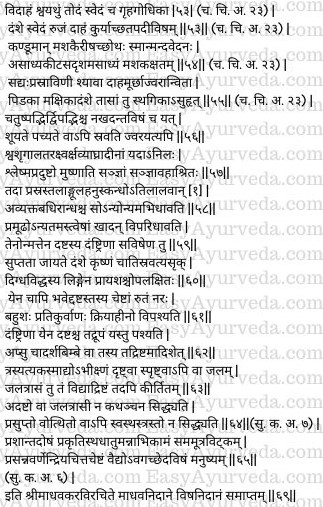

Symptoms of bite by house lizard, centipede, mosquitoes, bees
Bite by house lizard – will cause severe burning sensation, swelling, pricking pain and perspiration.
Bite by the centipede – will cause excessive sweating, pain and burning sensation.
Bite by ordinary mosquitoes – will cause itching, slight swelling and mild pain. Bite of poisonous mosquitoes will be incurable just like the bit of poisonous insects.
Sting by bee – will produce immediate discharge (of blood), blackish discolouration, burning sensation, fainting, fever and papules. Among all the bees, the sting of sthagika variety of bee will be fatal. (53-55)
Symptoms of bite by animals of four or two legs
Assault by the claws and teeth of animals of four or two legs will cause swelling, suppuration (putrefaction), discharges (exudation) and fever. (56)
Symptoms of effect of poison in tiger etc wild animals
In animals like dogs, fox, hyena, bear, tiger etc, when Vata is vitiated by increased kapha attacks and destroys the nervous system, the consciousness (intelligence) of these animals get hampered and they become rabid. In such animals the tail, lower jaw and shoulders will drop down, saliva starts dribbling from their mouth in large quantities. The animals appear blind and deaf to a certain extent and run towards each other. Among these the one which has gone excessively mad will run amuck everywhere and run to bite the others. If bitten by such rabid animals there will be loss of sensation at the site of bite, discharge of black coloured blood in excess (or there will be blackish discolouration at the site and severe bleeding). There will be symptoms of wounds caused by poisonous weapons.
Read – Bleeding Disorders: Ayurveda Treatment, Diet, Home Remedies
The person who has been bitten by a rabid animal such as a dog etc will repeatedly keep imitating all the actions of that animal (whichever animal has bitten) and produces sounds (cries, shouts) similar to that animal. He will not be able to do any of his activities (becomes unconscious) and will face death. If one sees the image / reflection of the animal which has bitten him instead of his reflection in the water or mirror it shall be considered as a fatal sign. If the person bitten by a rabid animal becomes afraid of seeing or touching water it is known as Jalatrasa – hydrophobia. This is also a fatal sign. (57-63)
Another fatal sign
In spite of not being bitten by a rabid animal, if a person develops fear towards water, the condition should be considered as incurable. Similarly, if a healthy person develops fear towards water while sleeping or after waking up (in woken state) the condition shall be considered to be incurable. (64)
Nirvisha Purusa Laksana
Symptoms of person relieved from poison
Aggravation of doshas coming down (all the increased dosas getting back to normal), all the tissues coming back to normal state (become pure), developing desire for food, proper and timely elimination of urine and faeces, restoration of (becoming normal and pleasant) normal colour and complexion, functioning of the senses and mind and activities and behaviour – should be considered by the physician as the symptoms of the person completely relieved of poison. (65)
Thus ends the chapter on Visha .
Thus ends the chapter on Visharoga Nidanam in Madhava Nidana text written by Acharya Madhavakara.















